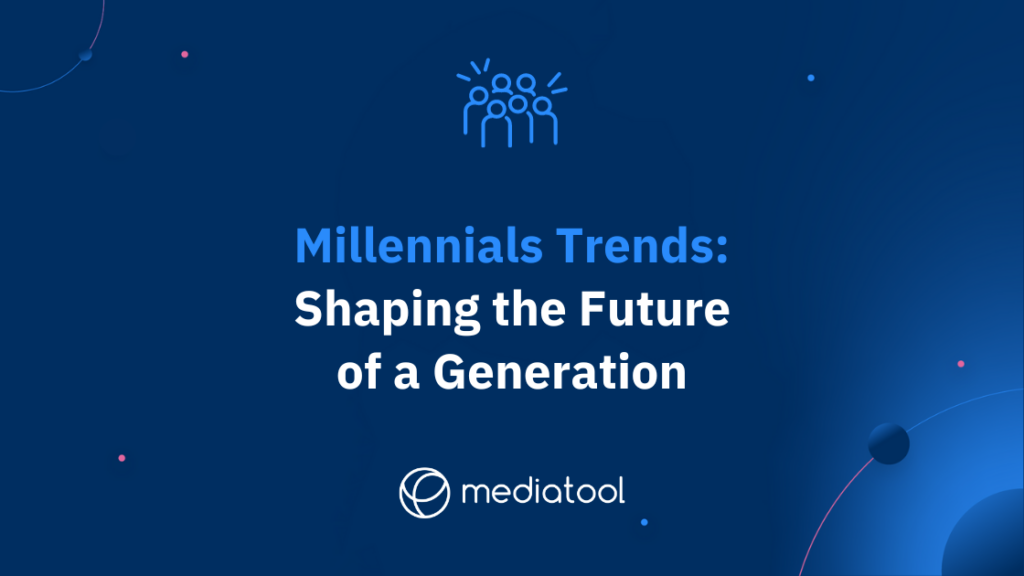Understanding Millennials: Unlike previous generations, millennials, born between the early 1980s and mid-1990s, have grown up during significant societal changes. The digital natives of our time, millennials, differ from the baby boomers, gen x, and gen z.
One of the distinct features of the millennial generation is their ability to adapt and evolve. Having been raised in a world that has witnessed unprecedented technological changes, millennials have become flexible thinkers and are often more open-minded than other generations.
Education and the Millennial Economy
College Education and Economic Power
The pursuit of higher education is a significant trend among millennials, showcasing their value on academic and professional advancement. Impressively, 39% of millennials aged 25 to 37 have attained at least a bachelor’s degree. This marks a substantial increase in educational attainment compared to previous generations, as only 29% of Gen Xers held a bachelor’s degree or higher when they were within the same age range. This commitment to education highlights the millennial generation’s dedication to improving their skills and knowledge, despite the financial hurdles that may come with it.
The Price of Knowledge
Rising costs in higher education have led to mounting student loan debt for young adults, making this age group question the return on investment for a bachelor’s degree. On average, student loan borrowers in the United States grapple with a debt of $37,338, a burden that undoubtedly affects their economic stability and future financial planning. Recent data indicate that more millennials are questioning the traditional pathway of attending a four-year university due to the rising costs and the looming student debt crisis. Online courses, certification programs, and alternative educational platforms are becoming increasingly popular among this age group.
Young adult households, especially millennial women, often compare their economic standing to baby boomers of the same age, and the disparities are stark. Many are reconsidering the notion of college education as the only gateway to economic power.
The Digital Shopping Trend: E-Commerce Reigns
The way millennials approach shopping has been revolutionized by the digital age, with a clear preference for the convenience and variety that online platforms provide. A staggering 80% of millennial shoppers now conduct the majority of their shopping online, underscoring the shift away from traditional retail outlets. Additionally, 56% of these shoppers prefer to make their purchases using a mobile device, showcasing their comfort and reliance on smartphones for daily activities.
Online trends heavily influence millennials’ purchasing decisions. E-commerce platforms, with their ease of use and variety, appeal to millennials’ desire for convenience and variety. Online shopping, coupled with price comparisons, user-generated content, and peer reviews, has transformed how millennials spend money.
This trend towards digital commerce aligns with millennials’ desire for quick and easy access to products and services, as well as their ability to swiftly compare prices and read reviews from their peers. Physical retail stores are witnessing a significant decline as a result, struggling to keep up with the rapid pace of change and the evolving preferences of this demographic.
Influencer Marketing & User-Generated Content
In today’s digital age, traditional advertising methods are often met with skepticism by millennials, making influencer marketing on social media platforms and user-generated content more impactful. Approximately 61% of millennials place their trust in product recommendations made by influencers, highlighting the significant role that these online personalities play in shaping purchasing decisions.
Millennials value authenticity and relatability, and they often perceive influencers, especially those who share their personal experiences with products or services, as more trustworthy compared to corporate advertising. This trust in influencers and preference for user-generated content demonstrates a shift in the way millennials consume information and make purchasing decisions, favoring a more personal and authentic approach.
The Shift to Video Content

Platforms like YouTube, TikTok, and Snapchat, which prioritize video content, have gained immense popularity among millennials. Through tutorials, vlogs, and interactive content, video marketing appeals to their preference for dynamic and engaging media.
With the decline of traditional TV, millennials are driving the push for streaming services that offer on-demand video content. This shift represents not just a preference for digital but also a desire for content that can be personalized to individual tastes.
The Future of Digital Interaction
With advancements in technology, millennials are paving the way for even more immersive digital experiences. Virtual Reality (VR), Augmented Reality (AR), and newer social media platforms are embraced, showcasing their constant thirst for innovative ways to connect and engage in the digital realm.
As digital natives, millennials and Gen Z are pushing the boundaries of how we perceive digital interaction. Unlike previous generations, they see the digital world as an extension of their physical reality, blurring the lines between them.
Family, Marriage, and Millennials
Delayed Life Milestones
Unlike their older counterparts from older generations, millennials have delayed marriage and starting families, often due to economic constraints like student debt. According to the Pew Research Center, the average age for marriage has been steadily increasing for millennials compared to baby boomers and Gen Xers at the same age. This delay in marriage is attributed not just to financial reasons but also to shifting cultural values.
Comparing Life at the Same Age
When observing millennial men and millennial women, it’s evident that young adult households today face different challenges than baby boomers did at the same age.
Financial Landscape: Income and Debt
Median Household Income
While many millennials are well-educated, the challenges of the great recession and student loan burdens have affected their median household income. Financial experts and advisers have seen an uptick in millennials seeking guidance. As student loan debt has doubled in recent years, more millennials are turning to experts to navigate the complexities of the financial landscape.
Seeking Financial Guidance
Financial experts have become crucial for this generation. Peer and positive reviews about financial strategies have become extremely important to millennials in their quest for financial stability.
The Social Media Boom and its Impact

Platforms and Power
Social media platforms have grown exponentially in the past few years. For millennial consumers, platforms like Instagram and TikTok blend entertainment, user-generated content, and video marketing. Social media isn’t just a tool for entertainment; it’s a powerful force shaping millennials’ political, cultural, and social perspectives. Especially for millennial women, platforms like Instagram have become spaces for activism, entrepreneurship, and community-building.
Millennial Women and Men on Social Media: Millennial women, particularly, have leveraged social media for both personal and professional growth, differing from both millennial men and women of past generations.
Generational Overlaps and Differences
Gen Z vs. Millennials: As digital natives, these younger generations have seen a world deeply integrated with the internet. However, there are subtle differences in how Gen Z and millennials, including younger millennials and older millennials, perceive the world. Key trends indicate that while millennials pioneered the social media age, Gen Z is refining it. They are more selective about the platforms they use, and while millennials were the flag bearers for authenticity online, Gen Z is pushing for even more transparency and realness.
Millennials vs. Gen Xers and Baby Boomers
Looking at age groups, millennials often contrast with both Gen X and Baby Boomers in values, spending habits, and life goals. One example that stands out is the attitude towards work. Unlike previous generations, notably, the silent generation and baby boomers, millennials and Gen Xers lean more towards valuing work-life balance and finding purpose in their careers.
Millennials and the Future
Preparing for the Next Generation
As millennials continue to age, the focus shifts to future generations. Their experiences, from the challenges of the Great Recession to the student loan crisis, will undoubtedly shape how they guide the next generation.
The resilience and adaptability millennials displayed during economic downturns and societal shifts are lessons that will be passed on. They have set new standards in many fields, and their influence will be seen in how future generations approach challenges.
New Trends on the Horizon
As the first generation to grow up in the digital age, millennials are pioneers in many respects. However, as they pave the way, new trends emerge, continuously reshaping the societal landscape. With the advent of technologies like AI and blockchain, millennials are expected to be at the forefront of integrating these into daily life, further blurring the lines between the digital and physical worlds.
Looking to the Future: Generation Z
While millennials have paved the way in reshaping societal norms and digital engagement, the next generation, Gen Z, is quickly establishing its own identity and preferences. In 2022, 73% of Gen Z consumers expressed that it is crucial for brands to raise awareness and take a stand on sensitive issues, reflecting a heightened sense of social responsibility and demand for corporate accountability.
This expectation for brands to be vocal and proactive about social issues surpasses even the millennial generation, showcasing Gen Z’s unique blend of pragmatism and idealism. Shaped in an era of rapid change and global challenges, their perspectives and demands are likely to lead to intriguing societal shifts in the years to come.
Observing millennial trends, especially their embrace of digital platforms and social activism, offers valuable insights into the behaviors and preferences of Gen Z. However, it is clear that Gen Z is forging its own path, demanding more transparency, authenticity, and social responsibility from brands and society at large.
Conclusion
Distinctly different from prior generations like the silent generation and baby boomers, Millennials have navigated a digital age reshaping societal norms. Highlighted by the Pew Research Center, their adaptability has been evident, especially with nearly half pursuing higher education despite the challenges of rising costs and escalating student loan debt. E-commerce and social media platforms, including influencer marketing, have significantly influenced how millennial consumers, especially millennial women, spend money.
The growing preference for user-generated content and video platforms showcases their need for authenticity. While they grapple with financial challenges from the Great Recession and student debt, they exhibit resilience by seeking expert financial advice. Unlike older age groups, many millennials tend to prioritize work-life balance, setting new precedents for Gen Z and future generations. As digital pioneers, they are shaping our integrated digital-physical future, making their societal impact profound and far-reaching.





